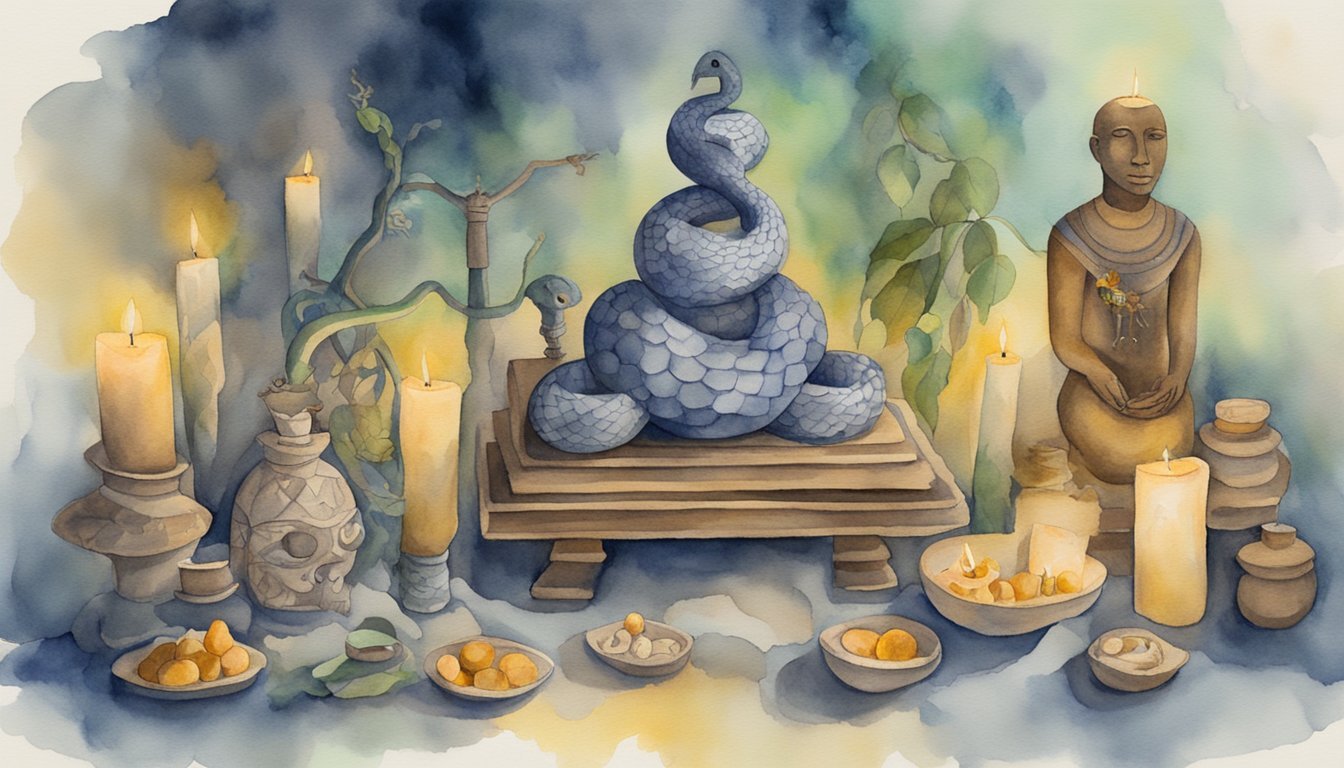Understanding Voodoo: Origins and Beliefs

Voodoo is a rich religious tradition deeply rooted in African spiritual practices and later syncretized with elements of Roman Catholicism. It remains a fundamental part of the cultural identity for many, and it’s embodied by its diverse beliefs, rituals, and historical significance.
Historical Roots and Spread
Voodoo, also spelled Vodou or Vodun, traces its origins to West Africa, with the Kingdom of Dahomey, present-day Benin, often cited as its birthplace. The Fon people of this region, along with the Yoruba and others, held spiritual traditions that included the worship of spirits, or loa. When the Atlantic slave trade forcibly brought Africans to the Caribbean and the Americas, their religious beliefs traveled with them.
In places like Haiti, slaves found themselves in the midst of brutal plantations and turned to their spiritual roots for solace and strength. Over time, the African beliefs blended with Roman Catholic elements—due to the imposition by French colonists—and this syncretism contributed to the rise of Haitian Voodoo. The religion played a notable role during the Haitian Revolution as a unifying force and source of empowerment for the enslaved people against the colonial oppressors.
Core Beliefs and Practices
Central to Voodoo is the worship of a singular supreme god, Bondye, which parallels the Catholic belief in God. Beneath Bondye are the loa, or lwa, spirits that are akin to saints in Catholicism and represent various aspects of life, nature, and the spirit world. Followers of Voodoo, known as Vodouisants, connect with the loa through rituals often involving music, dance, and sometimes animal sacrifice.
A vital figure in Voodoo is the priest, or houngan, and priestess, or manbo, responsible for guiding rituals and communication with the loa. Papa Legba, the loa associated with St. Peter in Catholicism, is seen as the gatekeeper of the spirit world, and must be honored at the beginning of any ritual. While voodoo dolls and spirit possession often feature prominently in folklore and misconceptions, these elements are part of a complex system of beliefs that emphasize the ancestral connection, the importance of community and reverence for the forces of nature.
Voodoo in Contemporary Society

Voodoo, often spelled “Vodou,” continues to influence and evolve within modern societies, reflecting a complex interplay between cultural practices and public perception.
Cultural Influence and Misunderstandings
Vodou has significantly impacted the arts, yet it is frequently misrepresented. The vivid ceremonials, characterized by song and dance, have inspired a range of artistic expressions. In places like New Orleans, these elements often contribute to the local ambiance, enriching the tourist experience. Conversely, the mainstream media’s portrayal of Voodoo frequently conflates it with notions of black magic, devil worship, or even cannibalism, leading to widespread misunderstandings. This image is far from the reality of Voodoo, which at its core, is a blend of West African spiritual traditions and Christian elements, commonly centering around healing practices and community well-being. A closer look at Haitian Vodou demonstrates complex rituals that could include offerings and possession ceremonies, led by a priestess or an oungan (male priest).
- In popular culture, terms like “zombies” and “spells” are often associated with Voodoo. These are usually sensationalized versions of more profound spiritual beliefs.
- Despite common misconceptions, Voodoo does not involve devil worship, torture, or satanism. These are mischaracterizations not recognized in the actual practice of Voodoo.
In contemporary Haitian society, Vodou serves in multiple ways, particularly in healing and as a way of life for its practitioners. Practitioners make offerings to various spirits, seeking their favor for health and protection. Anthropologist Nicholas Vonarx notes the importance of Vodou in Haitian society, emphasizing its role in offering health services and communal support.
Voodoo’s Role in Modern Communities
In modern communities where Voodoo is practiced, Vodou has been rediscovered as a tool of empowerment, especially within the Haitian diaspora. The underlying principles of Voodoo embody a deep connection with ancestors, as well as deities such as Legba, the gatekeeper to the spirit world, or Ezili Danto, who represents motherhood and love.
- Community ceremonies might involve dancing to the rhythmic beats of drums, intimate songs, and the receiving of spiritual messages through possession.
- Historical figures such as Papa Legba are revered within the Voodoo tradition; he is often depicted as a wise trickster who opens the crossroads for communication between the human and divine realms.
The influence of Voodoo and its practices is widespread, extending beyond Haiti to other areas of the Caribbean and the southern United States, particularly New Orleans. New Orleans Voodoo, for example, is a unique blend that has evolved by integrating aspects of local culture and other spiritual traditions, contributing to the city’s rich narrative.
- The significance of Voodoo extends to various facets of life, including love and relationships, where some individuals consult Vodou practitioners for guidance.
- Rituals can be highly personal, with offerings such as candles symbolizing prayer and devotion to the spirits.
Voodoo remains a vibrant yet often misunderstood element in many societies, intertwining with local cultures and forming a symbiosis between the old and the new. For those interested in the health aspects of Vodou, it is worthwhile to explore its practice with genuine curiosity and an open mind, acknowledging its role as a spiritual guide and healing source. Live Science explores the reality that much of what is popularly associated with Voodoo is markedly different from the genuine beliefs and practices of the religion.

